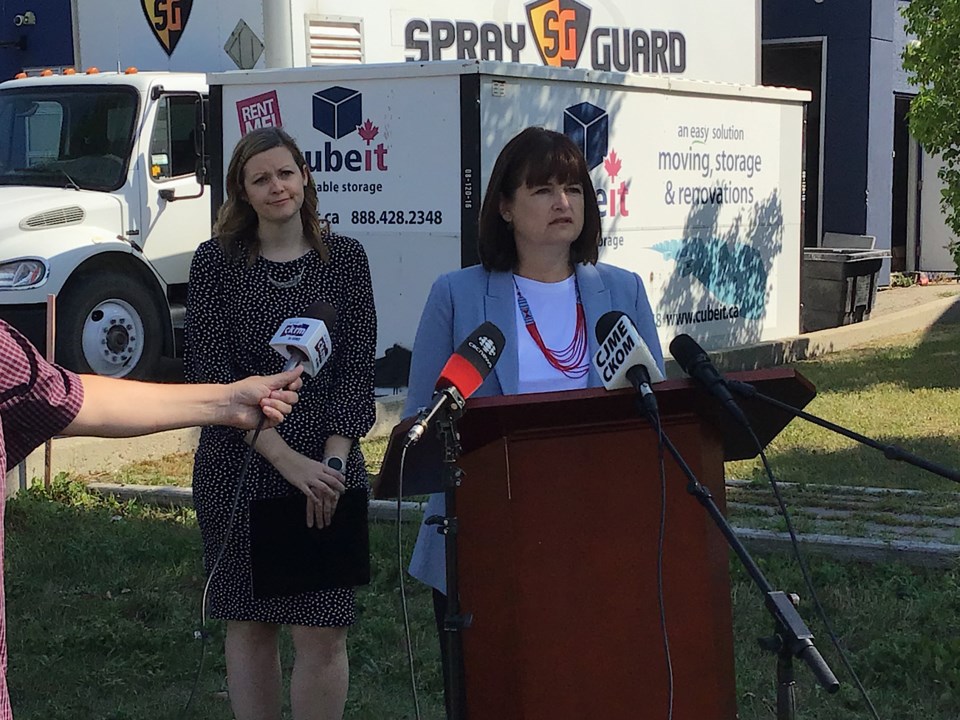REGINA - The opposition New Democrats are again taking aim at the Sask Party government for not putting forward the money from the recently-announced budget surplus to go into health care.
Opposition leader Carla Beck and Health Critic Vicki Mowat held a news conference Thursday in front of the former Pasqua South Medical Centre that had been operated by Dr. Tomi Mitchell, in an effort to highlight challenges in keeping doctors in the province.
The medical clinic at the location is now closed, and new tenants were seen moving in that day with moving vans already on the property.
Beck told reporters the $2 billion in resource revenues announced this week “should be great news for the people of Saskatchewan, but those aren’t Sask Party resources. They belong to the people of Saskatchewan."
“This tired Sask Party government told us this week that they won’t invest a single dollar in the hospitals, clinics, or long-term care. Frankly, this is absurd.”
Earlier this week, during the announcement of the first quarter financial update, Finance Minister Donna Harpauer had announced a $1 billion surplus as well as measures including sending all residents over age 18 a $500 affordability tax credit cheque, no longer extending the PST to gyms, and retiring $1 billion in debt.
When asked on Tuesday why surplus money was invested into health care, Minister Harpauer responded that “we are very, very, very mindful of taking what will be one time revenue and putting it into ongoing year over year operating. That is something that governments in the past, and even our own government has done in the past, and then when those resource revenues fall in price, then the government’s jammed because they have increased their operating year over year costs but they don’t have the revenue to support it. And then they have to look to where that money is going to come from. We don’t think these prices will hold ongoing - should they, then we’ll make different decisions going forward.”
That answer from Harpauer drew a reaction from Beck on Thursday.
“To Minister Harpauer, I say we disagree. The only thing that is unsustainable is letting our health care system burn while you top up your coffers… this choice, and this is a choice, not to invest in our health care system at such a crucial time is like choosing to pay down the mortgage while the roof is caving in.”
Health Critic Mowat noted there were options available to use the surplus money. She pointed to signing bonuses for health care professionals in underserved regions, recruitment incentives for scarce positions currently impacting bed closures, considering opening up one-time training seats at post secondary institutions and health care programs, and more support for community clinic style initiatives.
“These are solutions that we can afford that would help to get our health system back on track and save us money in the long run,” Mowat said. As an example she pointed to BC’s $118 million in stabilization funding over four months to help primary care providers stay open.
The NDP also were critical of the government for sitting on $62 million received from the federal government to address wait times, of which they have spent $20 million.
“There are solutions here to be found,” said Beck. “Some of them will require investments, some of them are not as costly things like instead of posting temporary part-time positions, posting permanent full-time position. There are solutions. Every community that we’ve been in, every group of healthcare workers that we’ve talked to is eager to come forward with solutions but right now they don’t have a willing partner in this government, a government that appears to have again taken the summer off, and we’re demanding that investment but also demanding this government get back to the table and start addressing this crisis.”
With respect to the recruitment challenges, Beck said a lot of doctors and health care workers were looking at quality of life.
“We’ve got healthcare workers right now who can’t access it because they’re working forced overtime, 16 hour shifts, doctors on call for 90 hours.”
When asked about where those health professionals leaving the province were going, Mowat said it was a mixed bag from what she had heard, including “folks that are going to Ontario or British Columbia who have been recruited by other provinces.”
“We know the recruitment is active right now so people are feeling the pulls in terms of salary, in terms of workload, as well, if they know they have places they’re going to go (with) set hours, where they’re going to be compensated appropriately,” said Mowat.
“It’s sort of been ‘anywhere but here’ that I’ve heard from folks.”
“The government should understand why people are leaving,” said Beck. “I would hope they are conducting some of those interviews figuring out why it is that people are leaving this province. I know what people have told us. I know very publicly we saw Dr. Kevin Wasko leave with a fairly detailed description of why he was leaving the province and similar accounts from other physicians and health care workers. It doesn’t seem to spark the curiosity of the government right now why it is that we seem to be losing more health care workers out of this province than other places.”
Wasko, who had been a leader of the province’s pandemic response, had cited fatigue as one reason why he was leaving the province for Ontario earlier this year.
It is possible the province could be about to make an announcement regarding addressing the recruitment issue. When asked on Tuesday what the province might do on recruitment or signing bonuses, Harpauer had said “stay tuned.”
She said their two health ministers “have been working very diligently in consultation with the stakeholders and I think you’re going to see some initiatives in the very near future.”






